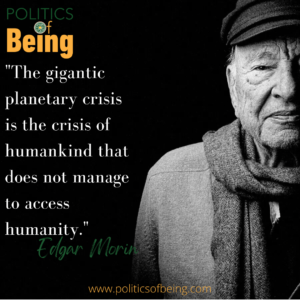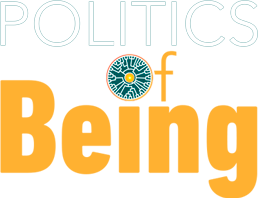
Politics of Being : Converging Views from Different Wisdom Traditions
An excerpt from the book chapter: Being as the New Paradigm
“This idea of making inner development the center and goal of societies and politics has already been expressed in different ways. From a spiritual point of view, the Bahá’i religion considers development an organic process in which “the spiritual is expressed and carried out in the material,” and its prophet, Baha’u’llah, taught that societies should create a milieu favorable to the healthy growth of all their members, to the development of their spiritual qualities and virtues. Likewise, Confucius’s essential teaching is for nations to support the cultivation of their members’ virtues that are necessary both for social order and for each of them to become more fully human.
Sri Aurobindo wrote that “the radical defect of all our systems is their deficient development of just that which society has most neglected, the spiritual element, the soul in man which is his true being.” He considered that human societies never really approached their development from an authentically spiritual perspective. “If we look at the old religions in their social as apart from their individual aspect, we see that the use society made of them was only of their most unspiritual or at any rate of their less spiritual parts.” He also believed that the largely failed endeavors to socialize spirituality and apply it to societies underline religions’ incapacity for regenerating humankind. He believed, “A society which was even initially spiritualized, would make the revealing and finding of the divine Self in man the supreme, even the guiding aim of all its activities, its education, its knowledge, its science, its ethics, its art, its economical and political structure.”
[…]
This idea has also been very present in Western philosophy. For example, Aristotle considered the purpose of the good state to be forging the virtues of its citizens, providing them the means for self-fulfillment. More recently, French sociologist and philosopher Edgar Morin, ninetynine years old as I write, has developed a similar viewpoint. […] According to him, “The gigantic planetary crisis is the crisis of mankind that does not manage to access humanity,” as revealed by its inner underdevelopment. “There is above all the immaturity of nationstates, of minds, of consciousnesses, that is to say, fundamentally, mankind’s immaturity to accomplish itself.” As a humanist, Morin believes in a process of “hominization” by which human beings could become more evolved and truly human. One of his books opens with a quote from German philosopher Friedrich Schlegel: “To attain humanity, there is a need of a sense of beyond humanity.”
In 1965, in Introduction to a Politics of Human, Morin adopted a rather anthropological perspective to call for “a politics of the whole human being.” He called this “anthropolitics” or “politics of human,” whose advent he considered natural, engraved in the very new (quoted by US president Truman in 1949) notion of “development” in politics. Morin predicted that “more and more, the nuclear center of politics would be the human to become in the world” and that this anthropolitics should allow us to “unify in one multidimensional politics all the fragments of politics.” He recognized that since the French Revolution and during the last two centuries, politics has progressively extended its field of action from its initial focus on social order. It has included, on the one hand, all the aspects of social life (economics, health, education, demography, culture … ) and, on the other hand, philosophical problems related to the meaning of life (Marx’s conception of politics as a way to fulfill philosophy, the French Revolution’s recognition of happiness as the ultimate goal of politics, our contemporary search to fulfill human aspirations … ).
This led Morin to conclude that “all the avenues of the living (from the ‘surviving’ to the ‘is this how men live?’) and all the avenues of politics are starting to cross themselves and announce an onto-politics, concerning in an increasing intimately and globally the being of human.” Morin believes the current political crisis rests on the inability of politics to assume this endeavor. According to him, “An ideal of consumption, supermarkets, gains, productivity, GDP, cannot satisfy the deepest aspirations of a human being, which are to realize themselves as a person in a solidary community.” Thus, “the development of human beings, of their mutual relations, of the societal being, is the purpose of the politics of human in the world, which calls for the pursuit of hominization.” “It is about going on with the millenary search for consciousness, love, science, going on with these streams by making them converge.”
